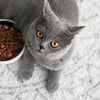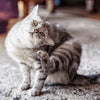Choosing the Right Nutrition for Your Cat
- by Rufus and Coco
With an abundance of diets to choose from, ranging from budget-friendly to premium selections, available both in pet shops and online marketplaces, picking the right food to feed your cat can be overwhelming.
Since every cat is unique, their dietary requirements should be tailored to meet their individual needs. In this article, we look into the proper nutrition for your feline friend, taking into account their age and various other essential factors.
How to Choose the Right Kind of Food for Your Feline
What Is Tailored Nutrition?
Tailored nutrition is a term that refers to choosing a diet that’s customized as per your cat’s needs. In other words, when pet nutritionists, chefs, and veterinarians get together and create a diet for a cat, they do it with a specific health requirement list in mind.
Multiple factors, such as age, gender, reproductive status, health, and others, affect a cat’s ideal diet.
You can’t expect to feed the same diet to a three-month-old kitten and a 10-year-old cat. Spayed and neutered pets may also have different nutritional needs, especially in their senior years, and compared to their intact counterparts, they are more predisposed to obesity and diabetes, too.
Typically, it can be challenging to gain access to tailored nutrition if you’re looking to base your cat’s diet strictly on commercial cat food. Plenty of prescription diets exist, but most are made considering just one or two factors.
For example, if your pet has kidney disease, diabetes, and hyperthyroidism simultaneously, you may have difficulty finding a cat food variety that addresses all of these needs.
Tailored Nutrition for Kittens
Kittens have different nutritional requirements compared to adults and seniors. During this stage of their life, they are growing constantly, which means that about 30% of their diet should consist of high-quality protein.
Pet owners who do not work from home might be interested in transitioning to dry food as soon as possible, but it is essential to take some time and look at the pet food label. More often than not, the protein sources are not the best – especially with the cheapest varieties. Instead of real meat, they may contain meat by-products like hoofs, skin, and cartilage.
Free feeding is a good option for a growing kitten, especially if they aren’t overweight. An article reviewed by veterinarian Amy Flowers recommends avoiding giving kittens raw eggs, fish, meat, liver, and milk.
Kittens need to eat more often compared to adults, too. While you’re not going to need to feed your kitten once every few hours once they are over the age of six weeks, it’s still a good idea to allow them access to quality food as often as possible.
Tailored Nutrition for Adult Cats
First of all, when do cats become adults? For most breeds, that happens around the age of 12 months, but there are some late bloomers, such as the Maine Coon (and other large cat breeds), that reach sexual maturity around 18 months instead.
While adults don’t need as much protein as kittens, they are still obligate carnivores. Remember, in the wild, cats feed on small prey, so the amount of vegetables or grains they get is minimal, if not nonexistent.
While dry food takes the cake when it comes to convenience, you must remember that it contains only about 10% moisture, which means that your cat will not get hydrated while eating it. Cats are already notorious for not drinking enough water, so you may have to consider feeding your pet a wet diet instead.
Canned food is also better for cats as it is more species-appropriate, although customized diets are the best. If your adult cat is otherwise healthy at this stage in their life, you can choose a prescription diet.
Tailored Nutrition for Senior Cats
Some vets say that cats become seniors on their 7th birthday, while others argue that they become geriatric cats only after being alive for at least a decade. The debate could go on for years, but the point is that once they do pass the 7-year mark, they have to receive more care and attention.
Even though they are still carnivores, some cats may develop kidney disease in their later years, which means that they may have to benefit from a lower-protein diet.
A diet that isn’t rich in sodium, phosphorus, and potassium can also benefit kidney health.
It’s not uncommon for some senior cats to experience digestive complications, food allergies, or food intolerances, which means that their diet needs to be as easily digestible as possible. These cases might even call for cat diets based on novel proteins such as elk, venison, or alligator.
Diet Nutrients and Individual Necessities
Besides the three main groups (protein, fats, and carbs), all healthy cats need water, vitamins, and minerals.
Some examples of vitamins all cats require are B vitamins, vitamin C, and fat-soluble ones such as A, D, E, and K.
Minerals are necessary for substance exchanges to happen on a cellular and tissue level inside your cat’s body. There’s no specific guideline as to how much cats should receive (except for seniors), but some of those that your pet may need range from calcium and phosphorus to magnesium, iron, copper, zinc, and iodine.
Are Fresh, Gourmet Pet Meals Good for Your Cat?
The short answer to this question is yes.
The more customised a cat’s diet is, the better for their health.
If you have access to a service where you can fill out a form with your cat’s age and other factors and the diet is developed in accordance with these aspects, it goes without saying that it will be healthier than any kibble or wet cat food manufactured by huge companies.
Fresh pet meals also use species-appropriate ingredients. That means that they should have as low grain content in their meals as possible. Ingredients such as wheat or corn are inappropriate for them, but they can get the right amount of fiber from pumpkin or sweet potato instead.
Furthermore, most gourmet pet meal services are designed with the help of veterinarians and pet nutritionists. These professionals can specify the amount and type of proteins, fats, or carbs and the ideal sources for every cat category – so that the diet ends up being as healthy for pets as possible.
- Posted in:
- australia
- behaviour
- cat
- cat explorer
- cat facts
- cat litter
- cats
- clean-up
- dog
- dog facts
- exercise
- food
- fun
- grooming
- health
- health-tips
- holiday
- how to help
- litter
- new arrivals
- new items
- news
- tips
- toys
- travel
- weekitty





